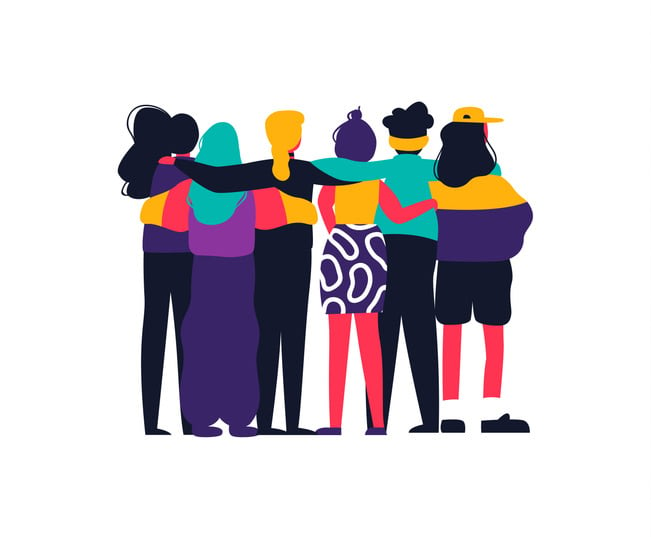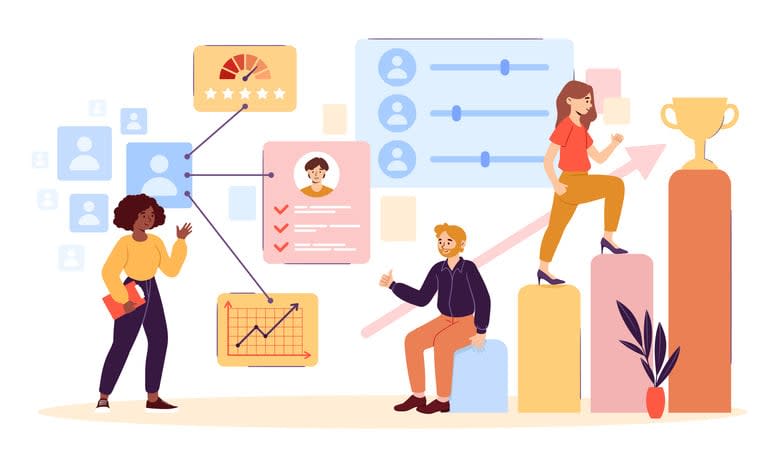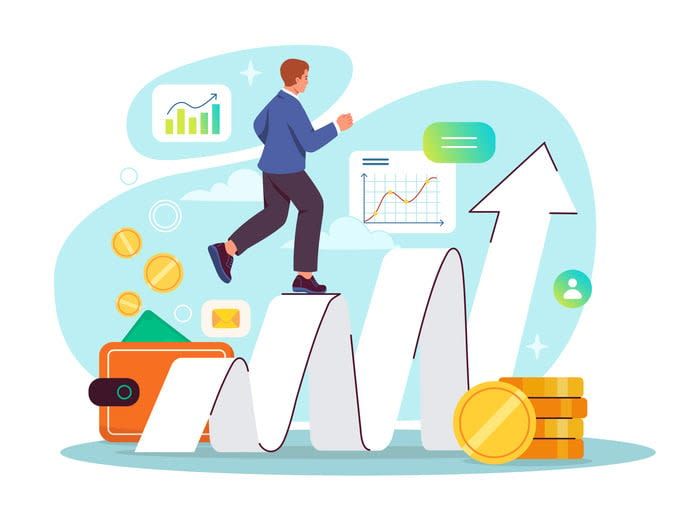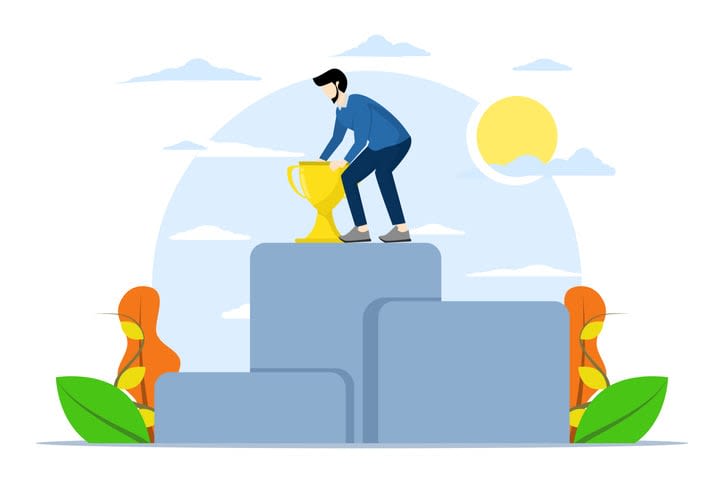You want to be a better, perhaps smarter, worker or leader. But what are some pragmatic strategies for real-life improvement? Discover the best methods to improve your personal resilience, upgrade your professional skills, and refine your relationships. Our straightforward insights to transform your ambitions into achievements can set you on the path to progress.
Key takeaways
- Personal growth is a continuous journey that involves self-reflection, learning from past mistakes, and focusing on present and future opportunities for improvement.
- Developing key habits like setting SMART goals, practicing discipline and consistency, and engaging in lifelong learning are fundamental to achieving personal and professional success.
- Building strong relationships, leveraging cutting-edge collaboration tools like Kumospace, and viewing life’s failures as learning opportunities are pivotal to improving your personal and professional life.
Embracing the journey to become a better person

Becoming a better person is not a destination but an ongoing journey, a commitment to continuous improvement and adaptation. It’s about recognizing that the progress made so far is not the ceiling of your potential but the foundation upon which further development is built.
As you engage with the world around you, remember that embracing change is not just necessary but beneficial, allowing you to learn from each life experience and grow in wisdom and character. This evolution towards the best version of ourselves is not a linear process but an intricate dance between who we were, who we are, and who we aspire to be.
It’s about acknowledging our growth, accepting change as a constant, and realizing that this journey itself is a testament to our potential.
The path to self-improvement can take many forms, from studying admired leaders or following more holistic paths, and trying to replicate their steps at your own pace. You can also change how you work to improve yourself and your processes, with remote virtual offices helping change personal and corporate cultures.
Recognizing past mistakes and learning from them
Reflect for a moment on the past. How often have we tripped over the same obstacle, not because we were blind to it, but because we failed to recognize the lesson it was trying to teach us? Acknowledging our mistakes is the first step to freeing ourselves from the cycle of repetition. By objectively analyzing what went wrong, we can gain a clearer perspective on avoiding similar pitfalls in the future.
Self-reflection allows us to pinpoint our weaknesses, turning them from shadows that haunt us into signposts for improvement. Embrace each mistake not as a mark of failure but as an opportunity for profound personal and professional development.
The power of self-reflection and honest feedback
The mirror of self-reflection reveals more than just the surface of our actions; it delves into the depths of our values and goals, aligning our behavior with our aspirations. Regularly engaging in this practice fosters personal growth and highlights areas ripe for improvement. Acknowledging our emotional responses and decisions gives us valuable insights into our behavior patterns and decision-making processes. At work, understanding the value of and giving positive feedback is a strong sign of an emotionally mature team or business
However, our biases can sometimes cloud the mirror of self-reflection, where honest feedback's clarity becomes invaluable. When feedback is specific and constructive, it equips us with practical steps to improve both personal and work life. Drawing from diverse perspectives helps balance our self-view, preventing an overestimation or underestimation of our abilities.
To truly benefit from feedback, we must act on the insights provided, setting new goals or adjusting our strategies as needed.
Focusing on the present and future, not dwelling on the past
Dwelling on the past is like walking backward into tomorrow; it’s not the direction we strive for. Focusing on the present and future is crucial for making real progress and achieving long-term success. By focusing on what we can control right now and working towards our future goals, we transition away from the negative experiences that once defined us.
This forward-thinking mindset enables us to embrace new opportunities for personal and professional growth, turning the page to write new, more empowered chapters of our lives.
Developing key habits for self-improvement

As we journey towards self-improvement, it becomes evident that the establishment of key habits is the scaffolding upon which our success is built. Setting SMART goals provides the direction and motivation needed to transform our visions of the future into tangible realities, fueling both personal and professional growth.
It’s about being clear on the kind of person we want to become and making focused improvements that go beyond merely consuming self-help resources.
Time-bound goal setting and tracking progress
Do you know where you’re heading? Without time-bound goals, we risk wandering aimlessly, unsure if we’re moving closer to our dreams or merely circling back to where we started. Setting clear and measurable goals with realistic timelines provides direction and helps us track our progress, keeping our motivation alive.
Celebrating even the smallest victories along the way fosters a positive mindset that fuels our journey towards larger objectives without succumbing to burnout. Discipline and consistency are the cornerstones of this process, requiring regular reviews and tweaks to our goals as we advance. Through self-reflection and honest feedback, we ensure our learning is continuous and our mistakes are not repeated.
Cultivating discipline and consistency
Discipline is more than just a buzzword; it’s a lifestyle. Unlike willpower, which is fleeting, discipline is about making decisions today that will prevent future struggles. Establishing routines and habits provides a framework that helps us maintain control over our actions, guiding us toward our desired outcomes through decision-making, both business and personal.
Through discipline, we can achieve expertise in our professional field and become recognized as reliable and knowledgeable sources. By implementing the lessons learned from past mistakes, we exercise discipline, modifying habits or procedures that may have led to those mistakes in the first place.
Engaging in lifelong learning and personal development
The world never stops changing, and neither should we. Engaging in lifelong learning is essential for adapting to these changes, enhancing our professional skills, and fostering personal growth. Continuous learning sparks innovation, creativity, and critical thinking, leading to pivotal discoveries and progress.
Self-reflection is at the heart of this process, as it helps us understand our values and align our actions with our goals. Honest feedback, paired with self-reflection, is instrumental in pinpointing areas for improvement and advancing personal growth. Practices like journaling and mindfulness keep us focused on the present and future, preventing an overemphasis on past events.
Resources like ‘The Power of Now’ and ‘Mindset,’ along with online courses like ‘The Science of Well-Being,’ offer insights and practical tools for personal betterment. Self-compassion practices such as comforting the body, writing supportive letters to oneself, and engaging in mindfulness exercises are vital for personal development.
Harnessing the power of relationships

Relationships are the bridges that connect us to new opportunities, expanded networks, and valuable guidance. They are the channels through which we can enhance both our personal and professional lives.
Strong relationships and a positive employee experience contribute to job satisfaction, trust among colleagues, and improved problem-solving capabilities in the workplace.
Developing effective communication skills
How we talk and the words we choose can make or break the strength of our relationships. Clear and effective communication is essential for creating and maintaining genuine connections and success in daily life. By developing and honing our communication skills, including:
- active listening
- empathy
- clarity
- nonverbal communication
By building and improving the dynamics of our relationships, we foster hope, leading to greater success and satisfaction.
Practicing empathy and active listening fosters mutual respect and ensures individuals feel valued and understood, which is the bedrock of any strong relationship.
Investing time and effort in meaningful connections
Have you ever thought about the difference a solid relationship can make in your life? It’s not just about the money or the opportunities; it’s about the sense of belonging and emotional support that comes with it. Investing time and effort in relationships and making connections contributes to a fulfilling professional and personal life, opening doors to opportunities that might otherwise remain closed.
By dedicating ourselves to fostering these significant relationships, we pave the way for career advancement and greater personal fulfillment. Activities such as:
- volunteering
- socializing
- exercising
- seeking mentorship
can encourage self-compassion and support a healthier work-life balance.
Practicing empathy and active listening
When we truly listen, we do more than just wait for our turn to speak. Recognizing body language cues is an integral part of empathy and active listening in communication. These skills are the keys to enhancing our social interactions and truly understanding others’ perspectives.
We strengthen our personal and professional relationships by confidently employing effective listening and empathy, leading to a deeper connection and understanding.
Utilizing tools and resources for growth

Utilizing the right tools and resources is essential in the pursuit of personal and professional growth. Platforms like Kumospace facilitate team collaboration and productivity, which are essential elements of growth. The functionality of such virtual platforms is particularly crucial for remote work environments, allowing for a seamless virtual presence and engagement. By integrating these tools with other educational resources, individuals can significantly enhance their personal and professional lives.
In addition to Kumospace, there is an array of books, online courses, and communities that contribute to an individual’s journey toward self-improvement.
How Kumospace supports personal and professional growth
Kumospace is a smart collaboration platform and a catalyst for growth thanks to its social nature. It promotes lifelong learning by allowing managers and leaders to:
- Keep individuals informed about industry shifts during meetings and sharing articles
- Provide links to resources to help them master new technologies
- Host meetings to highlight individual or team skills to remain competitive
- Help workers share personal interests in social chats.
Through chat and meetings, teams can emphasize setting specific goals with timelines and track progress. Kumospace fosters a dynamic environment that consistently encourages workers to consider development opportunities and self-reflection, aligning with team goals and self-improvement objectives.
Best books and online courses for self-improvement
Books have always been gateways to new worlds of knowledge and inspiration for personal growth. ‘Think and Grow Rich’ by Napoleon Hill presents the success principles based on the lives of renowned figures like Andrew Carnegie and Thomas Edison. In contrast, ‘The Monk Who Sold His Ferrari’ by Robin Sharma imparts lessons on living a fulfilled life, highlighting the transformative journey of a high-flying lawyer into a monk seeking enlightenment. In addition to these timeless tomes, a plethora of online courses and strategies exist to boost professional skills and personal productivity.
Finding mentors and joining supportive communities
The quest for personal and professional excellence often requires support and guidance, which mentors and supportive communities can provide. Platforms like LinkedIn, Facebook, and Quora can be fertile grounds for finding mentors or peer groups by actively engaging within these online communities. Don’t overlook the potential mentors and peer groups that might already exist within your networks, including:
- Friends
- Family
- Colleagues
- Former teachers/lecturers
Additionally, websites like Meetup or Eventbrite are treasure troves for discovering online events, workshops, and courses that enable connections with like-minded individuals and mentors.
Overcoming challenges and embracing failure

The road to self-improvement is often paved with challenges and setbacks. However, developing a growth mindset is crucial, as it emphasizes developing abilities and intelligence through dedication and hard work.
Rather than seeing failure as an endpoint, regard it as a course redirection highlighting areas needing improvement.
Reframing failure as a learning opportunity
Consider the multifaceted nature of failure; it can be preventable, unavoidable, or even intelligent—with the latter offering quick, small-scale, yet rich learning opportunities. Embracing the concept of a ‘flopportunity’ can shift our focus from regret to a constructive analysis of what can be gleaned from these experiences, especially in the volatile world of remote work.
Self-reflection uses failure to sharpen decision-making skills and emotional intelligence, uncovering the underlying motives behind our emotions and choices. Each small goal achieved reinforces self-confidence and promotes a culture of lifelong learning, inching us closer to our larger goals and dreams.
Developing resilience and perseverance
Resilience and perseverance are the silent warriors in the face of adversity. Resilience allows us to adapt and recover from setbacks, maintaining flexibility and optimism, while perseverance is the unyielding determination to push forward despite challenges and rejection. Adopting a mindset that views failure as non-fatal and an essential part of learning fosters team and personal resilience and the drive to continue pursuing our ambitions.
By viewing setbacks as learning experiences and maintaining flexibility in our approach, we develop the grit needed to stay the course without abandoning our ultimate goal. Improving self-discipline reduces anxiety and increases achievement, complementing the development of resilience and perseverance. And, taking pride in minor accomplishments fosters a positive mindset that significantly impacts our journey toward personal goals, contributing to the growth of perseverance.
Seeking constructive feedback and implementing change
The alchemy of transformation begins with seeking and implementing constructive feedback. Setting clear expectations and boundaries with mentors or peer groups ensures that the feedback received is valuable and conducive to growth. A feedback-conducive environment, fostered by clear expectations and boundaries, enables effective communication and actionable advice.
The process of seeking and receiving constructive feedback is not just about hearing what others say; it’s about integrating that information to create meaningful personal and professional change.
Balancing self-improvement with self-acceptance

As we voyage through the sea of self-improvement, we must also drop anchor in the harbor of self-acceptance. Understanding and accepting our imperfections while still working towards personal growth ensures that we don’t erode our sense of self-worth as we strive for betterment.
Self-acceptance provides a stable foundation for pursuing growth and harmony, allowing us to realize our potential without succumbing to self-rejection.
Practicing self-compassion and patience
The art of self-compassion begins with mindfulness practices, which promote a non-judgmental awareness of our present state. Engaging in positive self-talk is a powerful strategy within mindfulness that enhances our ability to treat ourselves with kindness.
Recognizing impatience as part of the human condition allows us to address it with greater understanding and compassion. Mindfulness practices can mitigate the effects of impatience and foster a patient and kind-hearted response to ourselves by observing and labeling our emotions.
Recognizing personal strengths and celebrating small wins
The journey of self-improvement is illuminated by the recognition of our personal strengths. Self-reflection is crucial for working well with others, identifying your strengths, and laying the groundwork for continued development. Honest feedback from others offers a valuable perspective on our strengths and weaknesses, complementing our self-reflection for a more holistic self-assessment.
Celebrating each small victory along the way is not just motivational; it builds the resilience necessary to achieve our larger goals.
Maintaining a healthy work-life balance
In the quest for self-improvement, balancing our professional ambitions and personal lives is paramount. Achieving harmony between these demands reduces stress, less burnout, and an improved sense of well-being. A healthy work-life balance not only boosts productivity but also contributes to overall wellness and higher employee retention.
Managing time effectively and balancing work with personal life are essential habits for personal and professional success. In essence, carving out time for rest and enjoyable activities is as crucial as any self-improvement effort, as it prevents burnout and supports our well-being.
Summary
From the initial awakening to the importance of self-improvement to the final mastery of a balanced life, our journey is one of continuous evolution. We have explored the power of embracing our past, the strength found in discipline and learning, and the transformative impact of relationships. We’ve navigated the tools that aid our growth, the resilience necessary to overcome challenges, and the grace of self-acceptance. Let these strategies be the wings that elevate your personal and professional life to heights unimagined, as you become not only a better person but a beacon of hope and progress in a world that continually seeks improvement.
Frequently Asked Questions
Recognizing past mistakes allows us to learn from these experiences and prevents us from repeating the same errors, paving the way for significant personal and professional development.
Setting time-bound goals is crucial as it provides a clear timeframe for accomplishment, direction, and a sense of urgency. It helps measure progress, maintain motivation, and make aspirations more achievable. Time-bound goals add structure to drive action and meaningful progress.
Yes, cultivating discipline can make a significant difference in achieving goals, as it involves consistently aligning choices with long-term objectives and establishing routines and habits to stay focused. It enables progress even when motivation wanes.
Empathy and active listening are essential for fostering trust and understanding in relationships. They allow individuals to truly hear and consider others' perspectives, creating a supportive environment that strengthens personal and professional connections.
And just because your office has broken down lengthy meetings into quick chats on Kumospace, that doesn’t mean you can stop focusing, in fact greater concentration can help you work and collaborate smarter.
Maintaining a healthy work-life balance is important for self-improvement because it reduces stress, prevents burnout, and allows for greater productivity and engagement in all aspects of life. It also provides the necessary time to recharge and pursue activities that bring joy, supporting long-term self-improvement and overall well-being.





